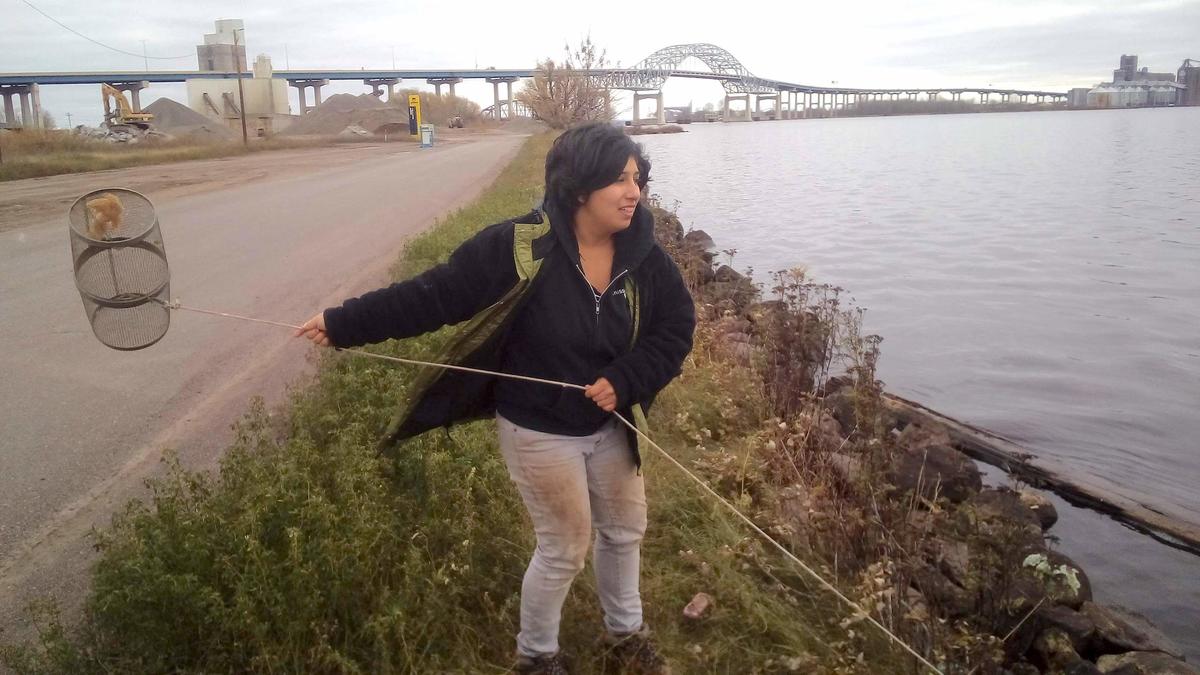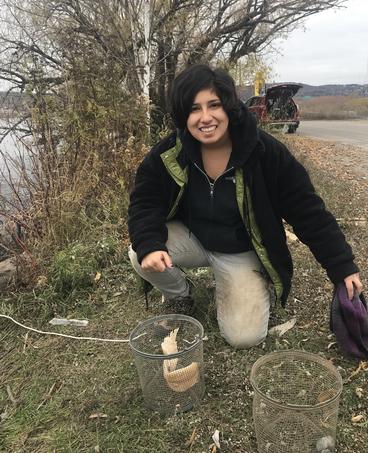It’s a brisk October morning and graduate student Maya Enriquez is walking along the shore. She is on the St. Louis River just before it flows into Lake Superior, searching for ropes hidden between boulders.
As she grasps a white cord, Maya reels in a metal trap, opening it to remove a slippery fish inside. She carefully flips the fish over to determine the gender and places it in a collection bucket. Then, she deploys the empty trap and moves on to the next site. The traps are designed to monitor the population of Round Gobies, an invasive species in Lake Superior.
Maya and undergraduate student Lily Hall spent the summer working to determine whether or not removing Gobies from the bay will impact the Goby population later in the season.
Every other day, the two researchers ventured out to retrieve and check the traps. They use a device called a hydrophone to attempt recording the noise of the Round Goby, and a GoPro to capture video of the fish entering the traps. The summer field season brought many challenges.
“The first time we went out, I slipped on a mossy rock and fell into the lake,” Maya says, “I also saw my first Mayfly swarm while collecting Goby traps. I had no clue what was going on.”
Maya had to walk through hundreds and hundreds of the fluttering insects as they rose up from the lake and into the air in thick clouds. “I was ready to turn around, but I made it through.”
New Perspectives
As a first-year master’s student in the integrated biosciences program and a recipient of the DOVE Fellowship, Maya joined the Round Goby project.
Although her future research will focus on neuroscience and bioacoustics, she says that the project had a positive impact on her graduate experience.
“It made me think about the ecological effects of animal behavior,” she says, “which is important when you are working with an organism.”
Loving the Laboratory
Originally from San Francisco, Calif., Maya’s love for research grew during her undergraduate years at Vassar College, where she worked in a lab studying Northern Saw-whet owls, a lab studying traumatic brain injury in Zebra Finches, and a cognitive science lab.
Her passion for animal physiology was sparked while she completed her senior seminar learning about the Gardiner's Seychelles Frog, the third smallest frog in the world. These frogs lack an inner ear. This phenomenon ignited her interest in sensory physiology and the auditory system.
“I found it so intriguing that these creatures had unique adaptations that allowed them to hear despite the fact that their inner ear was missing,” says Maya. “I also play the oboe, and my experiences as a musician drew me to the field.”
Planning to attend medical school, she took two gap years, working as a medical scribe and an EKG technician. After deciding that medical school was not the right fit, she began to research graduate programs. When she visited UMD Dr. Jennifer Liang and her mentor Dr. Allen Mensinger, they suggested she apply to the DOVE Fellowship.
UMD’s DOVE Recipient
The Diversity of Views and Experience or DOVE Fellowship is a prestigious graduate scholarship in the University of Minnesota system. Only 15 students receive the award each year. The fellowship is designed to give opportunities to students of diverse racial, cultural, socioeconomic, religious, and educational backgrounds, and provide funding for their graduate research.
“California is a very diverse place and coming to Duluth was a difficult adjustment. The DOVE Fellowship has allowed me to take the time I need to transition to living in Minnesota and focus on my classes and research,” says Maya. “I am a proud first-generation Latina student, and I’m excited to get involved in the UMD community.”
Maya joined Dr. Mensinger’s lab and is planning to do summer research at the Marine Biological Laboratory. In her spare time, she enjoys trivia nights with the other graduate students, finding new bakeries, acting in community plays, and spending time with her guinea pig and rescue cockatiels. She’s also a member of the UMD Symphony Orchestra.
“I can’t wait to start my own research project, attend conferences, and take new classes,” says Maya, “I hope to see more UMD students receive the DOVE Fellowship and to see UMD recruit more underrepresented minorities.”
About the Integrated Biosciences Graduate program
About the Department of Biology
This story was written by UMD University Marketing & P.R. student employee, Nora Curtis, a biology major with a minor in professional writing

